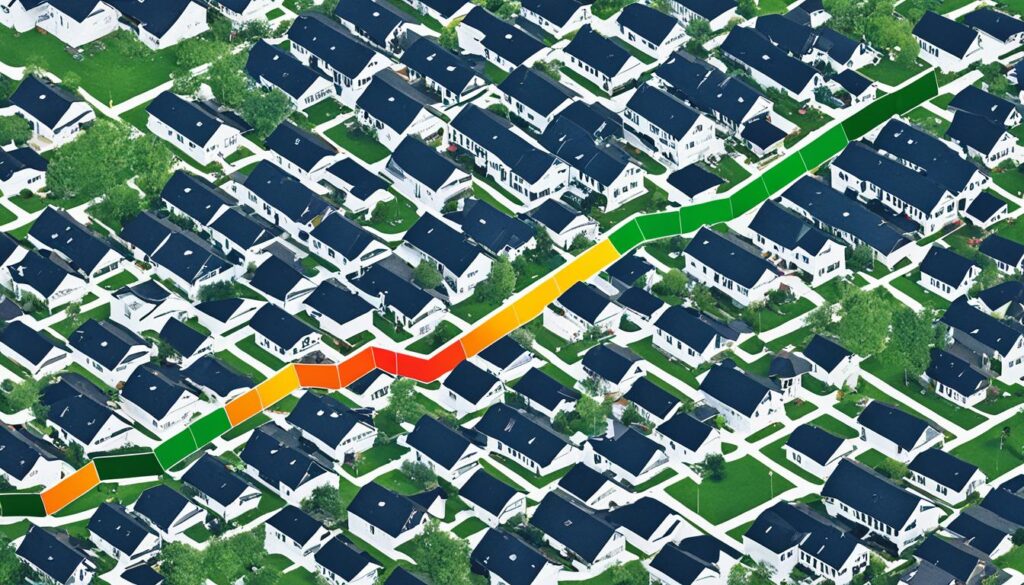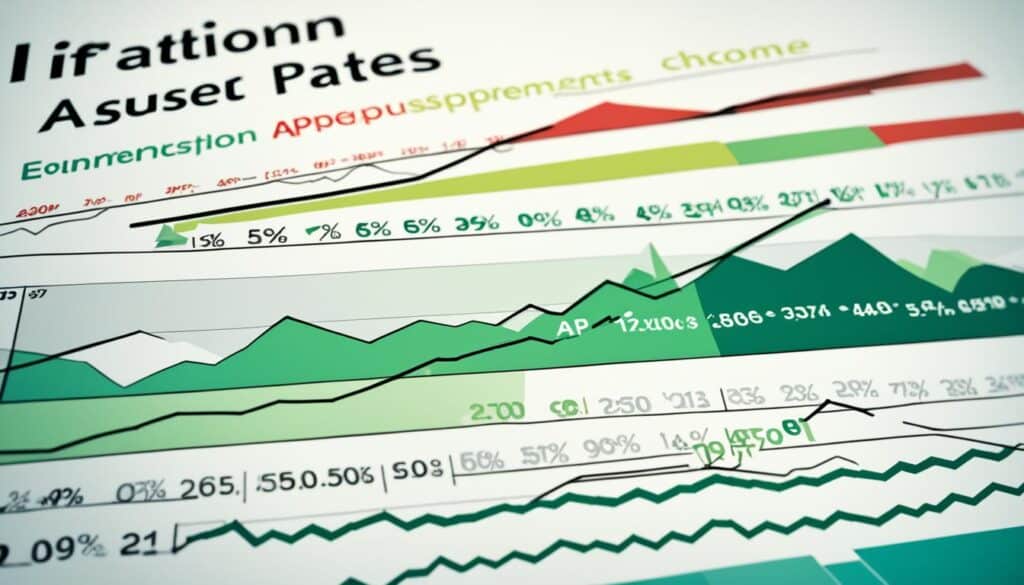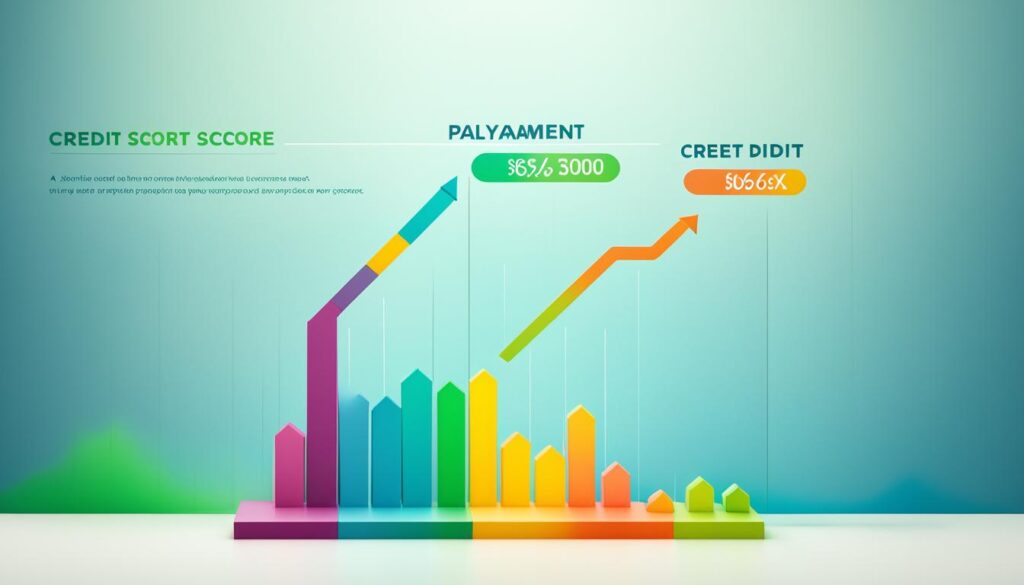Welcome to our comprehensive article, where we will delve into the intricacies of home loan interest rates. If you’re planning to secure a mortgage, understanding the factors that influence interest rates can help you make informed decisions and save money in the long run. Let’s explore the various aspects that shape home loan interest rates, from types of mortgages to market trends and strategies to secure the best rates for your mortgage.
Key Takeaways:
- Home loan interest rates play a crucial role in determining the cost of your mortgage.
- Factors such as credit score, loan amount, and central bank policies influence interest rates.
- Stay updated on current market trends to make informed decisions about your mortgage.
- Strategies like rate lock and getting preapproved for a mortgage can help secure favorable interest rates.
- Choosing the right mortgage lender is vital for obtaining the best home loan interest rates.
Understanding Home Loan Interest Rates
To begin, it is crucial to understand the basics of home loan interest rates. When obtaining a mortgage loan, there are two primary types of interest rates to consider: fixed-rate mortgages and adjustable-rate mortgages.
Fixed-rate mortgage: A fixed-rate mortgage offers a consistent interest rate over the life of the loan. This means that your monthly principal and interest payments will remain the same throughout the repayment period. Fixed-rate mortgages are ideal for borrowers who prefer stability and want to budget their finances without worrying about fluctuations in interest rates.
Adjustable-rate mortgage: An adjustable-rate mortgage (ARM) offers an interest rate that may change periodically after an initial fixed-rate period. The initial fixed-rate period can range from a few months to several years. Once the fixed-rate period ends, the interest rate may adjust based on changes in a specified index. This can result in changes to your monthly payments. ARMs are suitable for borrowers who expect their financial situation to change, such as those planning to sell their home or refinance before the initial fixed-rate period ends.
The interest rate on your mortgage loan plays a significant role in determining the overall cost of the loan. When comparing different loan options, it’s important to consider the interest rate along with the loan term, as they both impact the amount of interest you’ll pay over time. Lower interest rates can save you money in the long run, while higher rates can increase the cost of your loan.
By understanding the differences between fixed-rate mortgages and adjustable-rate mortgages, you can make an informed decision based on your financial goals and circumstances. The next section will explore the various factors that influence home loan interest rates.
Factors Influencing Home Loan Interest Rates
When it comes to home loan interest rates, there are various factors that come into play. Understanding these factors can help you make informed decisions and secure the most favorable rates for your mortgage. In this section, we will explore some of the key elements that influence interest rates in the housing market.
Credit Score
Your credit score plays a significant role in determining the interest rate you can get on your home loan. Lenders consider your credit history and score as an indicator of your ability to repay the loan. A higher credit score demonstrates responsible financial behavior and can make you eligible for lower interest rates. On the other hand, a lower credit score may result in higher interest rates or limited loan options.
Loan Amount
The loan amount you request can also impact the interest rate you are offered. Generally, larger loan amounts may come with higher interest rates due to the increased risk for lenders. This is why it’s important to carefully consider how much you need to borrow and explore different loan options to find the most favorable rates for your desired loan amount.
Mortgage Points
Mortgage points, also known as discount points, can influence your home loan interest rate. These are fees paid upfront to the lender in exchange for a lower interest rate over the life of the loan. Paying more points can result in a lower interest rate, potentially saving you money in the long run. However, it’s crucial to evaluate the cost of these points against your financial goals and the time it will take to recoup the investment.
Central Bank Policies
The policies set by the central bank, such as the Federal Reserve in the United States, can have a significant impact on interest rates. Central banks use tools like monetary policy to manage inflation, employment, and economic growth. Changes in these policies can influence borrowing costs for consumers, including home loan interest rates. It’s important to stay informed about central bank decisions and their potential effects on mortgage rates.
Housing Market Conditions
The state of the housing market can also impact home loan interest rates. When the demand for homes is high and the supply is limited, interest rates may rise due to increased competition among borrowers. Conversely, during periods of economic uncertainty or a slowdown in the housing market, interest rates may decrease as lenders aim to attract borrowers. Monitoring current housing market conditions can help you anticipate potential changes in interest rates.
Understanding the factors that influence home loan interest rates empowers you to make informed decisions when taking out a mortgage. By considering your credit score, loan amount, mortgage points, central bank policies, and the housing market conditions, you can effectively navigate the mortgage landscape and secure favorable interest rates for your home loan.
Summary of Factors Influencing Home Loan Interest Rates
| Factors | Description |
|---|---|
| Credit Score | Your credit score affects the interest rate you qualify for. |
| Loan Amount | The amount you borrow can impact the interest rate. |
| Mortgage Points | Discount points can lower your interest rate. |
| Central Bank Policies | The central bank’s decisions influence interest rates. |
| Housing Market Conditions | Market dynamics can affect interest rates. |
Current Market Trends in Home Loan Interest Rates
When considering a home loan, staying up to date with current market trends is vital. Being aware of the latest mortgage rates can help you make informed decisions and secure favorable interest rates for your home loan. In this section, we will analyze the current market rates, provide insights into how rates may vary depending on different loan options, and discuss the impact of interest rate fluctuations on the housing market.
Mortgage Rates Today: Understanding the mortgage rates today is essential for borrowers looking to capitalize on favorable rates. By keeping track of the latest rates, you can set realistic expectations and plan your home loan accordingly.
“The current mortgage rates are at historic lows, offering homeowners and buyers attractive financing opportunities for their dream homes.”
In today’s market, rates may include various components, such as the interest rate, lender fees, and points. It’s crucial to understand these factors when evaluating different home loan options. By examining the details, you can make an informed decision that aligns with your financial goals.
Exploring Home Loan Options
Interest rates fall into the category of home loan options, and they can have a substantial impact on your overall mortgage experience. Different types of home loans come with varying interest rates, and understanding your options can help you secure the best rates for your specific needs.
For example, a fixed-rate mortgage offers stability, allowing you to secure a low interest rate for the entire loan term, typically 15 or 30 years. On the other hand, an adjustable-rate mortgage (ARM) typically starts with a lower interest rate, but it may adjust periodically, depending on market conditions.
Exploring various home loan options can provide valuable insights into the different interest rates available and help you decide which loan structure is best suited to your financial situation.
Impact on the Housing Market
The fluctuation in interest rates directly affects the housing market. When interest rates fall, it generally leads to increased homebuyer demand. Low mortgage rates can make homeownership more affordable and enticing, stimulating the real estate market.
Conversely, rising interest rates may create a sense of urgency among prospective buyers who want to secure a mortgage before rates climb further. This can lead to increased competition and potentially drive up home prices.
Understanding the correlation between interest rates and the housing market is crucial for both buyers and sellers. By staying informed about market rates and trends, you can make strategic decisions that align with your financial goals.

Summary
In summary, keeping an eye on the current market trends in home loan interest rates is key when considering a mortgage. By staying informed about mortgage rates today, exploring different home loan options, and understanding the impact of interest rate fluctuations on the housing market, you can make informed decisions and secure the best possible interest rates for your home loan.
Strategies to Secure the Best Home Loan Interest Rates
When it comes to securing the best home loan interest rates, having a solid strategy can make all the difference. In this section, we will provide you with effective strategies to help you navigate the mortgage market and secure the most favorable rates for your home loan.
1. Rate Lock
One key strategy to consider is a rate lock. A rate lock is a commitment from a lender to hold a specific interest rate for a certain period of time, typically during the loan application process. By locking in a rate, you can protect yourself from potential rate increases while your loan is being processed, giving you peace of mind.

2. Compare Current Mortgage Rates
Another important strategy is to compare current mortgage rates from different lenders. By doing your research and exploring multiple options, you can gain a better understanding of the interest rates available in the market. This will enable you to make informed decisions and potentially secure more competitive rates for your home loan.
3. Get Preapproved for a Mortgage
Getting preapproved for a mortgage is a valuable strategy that can enhance your negotiating power and help you secure better interest rates. Preapproval involves a thorough review of your creditworthiness and financial situation by a lender. By obtaining preapproval, you demonstrate to sellers that you are a serious buyer, giving you an advantage in the home buying process.
4. Explore Refinancing Options
Refinancing can be a strategic move to secure better interest rates. If market conditions are favorable or if your credit score has improved since your initial mortgage application, refinancing your home loan could potentially lower your interest rate and save you money in the long run. It’s important to carefully consider the costs and benefits before deciding to refinance.
By implementing these strategies, you can increase your chances of securing the best home loan interest rates. Whether you opt for a rate lock, compare current mortgage rates, get preapproved for a mortgage, or explore refinancing options, taking proactive steps will empower you as a borrower and potentially save you thousands of dollars over the life of your loan.
Making Sense of Mortgage Rates and APR
When it comes to obtaining a mortgage, understanding the difference between mortgage rates and APR (Annual Percentage Rate) is crucial. While both terms are related to the cost of borrowing, they represent different aspects of your loan.
The interest rate is the cost of borrowing the principal amount, expressed as a percentage of the loan. This rate determines the monthly payments you will make towards your mortgage. The interest rate you receive is influenced by factors such as your credit score, loan term, and market conditions.
On the other hand, the Annual Percentage Rate (APR) provides a more comprehensive view of the total cost of your loan. APR includes both the interest rate and any additional loan costs, such as origination fees, points, or closing costs. It is a valuable tool for comparing different loan offers and understanding the overall expense of borrowing.
While the interest rate primarily influences your monthly payments, the APR reflects the true cost of the loan over its entire term. It’s important to note that the APR may be slightly higher than the interest rate due to the inclusion of fees and other costs associated with the loan.
When comparing mortgage options, looking at both the interest rate and APR can help you make an informed decision. If you prioritize lower monthly payments, focusing on the interest rate may be sufficient. However, if you want a complete understanding of the total cost of borrowing, the APR is the more accurate indicator.
Let’s consider an example to illustrate this difference:
You are considering two mortgage offers:
- Loan A: Interest Rate of 4%, APR of 4.5%
- Loan B: Interest Rate of 4.5%, APR of 4.7%
At first glance, Loan A may appear more favorable due to its lower interest rate. However, when you factor in the APR, you’ll notice that Loan B has slightly higher costs associated with it. The APR takes into account the additional loan fees, which influence the overall expense of borrowing.
Understanding the difference between mortgage rates and APR is essential for making well-informed decisions during the mortgage application process. Take the time to compare loan offers, considering both the interest rate and APR, to ensure you choose the loan that best suits your financial needs.
Comparing Mortgage Rates and APR
| Mortgage Offer | Interest Rate | APR |
|---|---|---|
| Loan A | 4% | 4.5% |
| Loan B | 4.5% | 4.7% |

Exploring Different Mortgage Options
When it comes to obtaining favorable interest rates, choosing the right mortgage option is crucial. Let’s take a closer look at different mortgage terms and explore the benefits of specific loan options.
30-Year Fixed-Rate Mortgage
A 30-year fixed-rate mortgage is a popular choice among homebuyers. With this type of mortgage, the interest rate remains constant for the entire 30-year duration of the loan. This stability allows homeowners to plan their finances accordingly without worrying about fluctuations in interest rates.
15-Year Fixed Mortgage
For borrowers looking to pay off their mortgage faster and save on interest, a 15-year fixed mortgage may be suitable. With a shorter loan term, homeowners can build equity more quickly, and the interest rate tends to be lower compared to longer-term mortgages.
Federal Housing Administration (FHA) Loans
Loans insured by the Federal Housing Administration (FHA) are designed to help individuals with lower credit scores or a smaller down payment qualify for a mortgage. FHA loans offer competitive interest rates and flexible eligibility requirements, making homeownership more accessible for many.
By considering these different mortgage options, you can align your financial goals with the right loan program. Whether it’s a 30-year fixed-rate mortgage, a 15-year fixed mortgage, or an FHA loan, each option has its own advantages and can contribute to securing favorable interest rates.
Also Read:- Small Business Loan Landscape: Diverse Options For Financing Success
Next, we’ll discuss the significant impact of credit scores and down payments on the interest rates you qualify for.

Impact of Credit Score and Down Payment
When it comes to securing a home loan, your credit score and down payment can have a significant impact on the interest rates you qualify for. Lenders use these factors to assess your creditworthiness and determine the level of risk involved in lending to you.
Your credit score reflects your financial history and how you have managed credit in the past. A higher credit score demonstrates responsible financial behavior and indicates to lenders that you are less likely to default on your loan. As a result, lenders are more inclined to offer lower interest rates to borrowers with higher credit scores.
Similarly, the size of your down payment can also influence the interest rates you are offered. A larger down payment reduces the loan-to-value ratio (LTV), which is the percentage of the loan amount against the appraised value of the property. A lower LTV ratio indicates less risk for the lender, which can translate into more favorable interest rates for the borrower.
On the other hand, a lower credit score or a smaller down payment may result in higher interest rates. Lenders typically charge higher interest rates to borrowers who pose a higher risk of defaulting on their loan. This is because they need to compensate for the increased likelihood of financial loss.
Improving Your Credit Score
If your credit score is not where you want it to be, there are steps you can take to improve it. Start by making all your bill payments on time and reducing your overall debt. Paying off credit card balances and keeping your credit utilization ratio low can have a positive impact on your credit score. It’s also important to review your credit report regularly and address any errors or discrepancies promptly.
Increasing Your Down Payment
If saving for a larger down payment seems challenging, consider exploring different strategies to increase your savings. This may include setting a budget, reducing unnecessary expenses, or exploring additional sources of income. The more you can save for a down payment, the better position you will be in to negotiate lower interest rates.

Ultimately, having a higher credit score and a larger down payment can help you secure a lower interest rate on your home loan. By demonstrating your creditworthiness and reducing the lender’s risk, you increase your chances of qualifying for more favorable terms and saving money over the life of your mortgage.
| Credit Score | Down Payment | Interest Rate |
|---|---|---|
| Excellent (760+) | 20% | 3.25% |
| Good (700-759) | 15% | 3.75% |
| Fair (620-699) | 10% | 4.25% |
| Poor (619 or below) | 5% | 4.75% |
Financial Calculators and Tools
When it comes to understanding the financial implications of your home loan, utilizing financial calculators and tools can be incredibly helpful. These resources allow you to easily calculate and compare different aspects of your mortgage, enabling you to make informed decisions. Let’s take a closer look at some of the essential tools you can use:
Mortgage Calculator
A mortgage calculator is a valuable tool that helps you estimate your monthly mortgage payments based on variables such as the loan amount, interest rate, and loan term. By inputting these details into the calculator, you can quickly see how different factors impact your overall payment. Whether you’re a first-time homebuyer or looking to refinance, a mortgage calculator can give you a clearer understanding of the financial commitment involved.
Mortgage Amortization Calculator
A mortgage amortization calculator provides a detailed breakdown of your mortgage payments over the life of the loan. It allows you to see how much of each payment goes towards principal and interest, and how your balance decreases over time. This tool is particularly useful if you’re interested in paying off your mortgage early or want to compare different loan terms to determine the most advantageous option for you.
Comparison Tools
Comparing loan offers from different lenders is a crucial step in the mortgage process. Fortunately, there are online tools that can simplify this task for you. These comparison tools allow you to input details such as loan amount, interest rate, and loan term to see how different offers stack up against each other. This way, you can easily identify the loan option that best suits your financial needs and goals.
By utilizing these financial calculators and tools, you can gain a better understanding of your mortgage and make informed decisions. Whether you’re estimating your monthly payments, analyzing your amortization schedule, or comparing different loan offers, these resources empower you to take control of your home loan journey.
Importance of Choosing the Right Mortgage Lender
When it comes to securing a mortgage, the choice of a mortgage lender is a crucial decision that can greatly impact the interest rates you are offered. Not all mortgage lenders are created equal, and selecting the right one can make a significant difference in your overall borrowing experience.
So, why is choosing the right mortgage lender so important? Well, the mortgage lender you choose will not only determine the terms of your loan but also influence the level of customer service you receive throughout the process. Working with a reputable lender who understands your unique financial situation and goals can lead to better interest rates and a smoother loan approval process.
Here are some tips to help you find the best mortgage lenders:
- Do your research: Take the time to thoroughly research and compare different mortgage lenders. Look for lenders that specialize in the type of loan you need and have a strong reputation for providing excellent customer service.
- Read reviews and testimonials: Check online reviews and testimonials from previous customers to get a sense of other borrowers’ experiences with a particular lender. This can give you valuable insights into their level of professionalism and reliability.
- Consider loan options: Look for mortgage lenders that offer a wide range of loan options to cater to your unique needs. Having access to various loan programs can increase your chances of finding a mortgage that aligns with your financial goals.
- Compare interest rates and fees: Don’t settle for the first mortgage lender you come across. Take the time to compare interest rates, fees, and closing costs from different lenders to ensure you’re getting the most competitive offer.
Getting approved for a mortgage can sometimes be a complex and time-consuming process. However, working with the right mortgage lender can make this journey smoother and more successful. A reputable lender will guide you through the application process, provide personalized advice, and help you navigate any challenges that may arise.
The Process of Getting Approved for a Mortgage
The process of getting approved for a mortgage involves several key steps:
- Prequalification: This is an initial assessment of your financial situation and creditworthiness. The lender will review your income, assets, and credit score to determine the approximate loan amount you may qualify for.
- Preapproval: Preapproval involves a more in-depth analysis of your financial documents and credit history. The lender will issue a preapproval letter stating the maximum loan amount you’re eligible for based on your financial profile.
- Loan application: Once you’ve found the right mortgage lender, you’ll need to complete a formal loan application. This involves providing detailed information about your income, employment history, assets, and debts.
- Underwriting: The lender will review your application and documentation, assess your creditworthiness and the risk associated with lending to you, and make a final decision on your loan approval.
- Closing: If your loan is approved, the closing process involves signing the necessary documents, paying closing costs, and officially obtaining the loan funds.
Choosing the right mortgage lender is a critical step in your home buying journey. By following these tips and understanding the process of getting approved for a mortgage, you can secure the best possible interest rates and enjoy a seamless borrowing experience.
So, take the time to research, compare, and choose a reputable mortgage lender that aligns with your financial needs and goals. This will help you navigate the mortgage process with confidence and increase your chances of finding the best mortgage terms available.
Conclusion
In conclusion, understanding the dynamics of home loan interest rates is crucial for anyone considering a mortgage. By comprehending the factors that influence these rates, staying informed about current market trends, and implementing effective strategies, you can secure the best possible interest rates for your home loan.
It is important to take the time to research and explore different mortgage options to find the one that best fits your financial goals and circumstances. Additionally, carefully selecting a reputable mortgage lender ensures that you’ll receive expert guidance and a smooth home buying experience.
Remember, favorable interest rates are not only crucial for saving money in the long run but also play a significant role in determining your monthly mortgage payments. By following the tips and information provided in this article, you are well-equipped to navigate the complex world of home loan interest rates and make informed decisions about your mortgage.
FAQs
Q: What factors impact mortgage interest rates?
A: Mortgage interest rates are influenced by factors such as economic indicators, inflation, the overall state of the housing market, the borrower’s credit score, and the type of loan.
Q: How do adjustable-rate mortgages differ from fixed-rate loans?
A: Adjustable-rate mortgages have interest rates that can fluctuate over time based on market conditions, while fixed-rate loans maintain the same interest rate for the life of the loan.
Q: How can I find the best mortgage lenders?
A: To find the best mortgage lender, compare interest rates, fees, customer reviews, and options for different types of loans offered by various lenders.
Q: What is the significance of the annual percentage rate (APR) in mortgage loans?
A: The annual percentage rate (APR) reflects the total cost of borrowing, including interest rates and additional fees, making it a crucial factor in comparing loan offers.
Q: How can I apply for a mortgage?
A: You can apply for a mortgage by contacting lenders, submitting a loan application with required documentation, undergoing a credit check, and getting pre-approved for a loan amount.
Q: Is it possible to refinance my current mortgage to get a lower rate?
A: Yes, you can refinance your current mortgage to take advantage of lower interest rates, potentially reducing your monthly payments or shortening the loan term.
Q: How can I get the best mortgage rate?
A: To get the best mortgage rate, maintain a good credit score, shop around for different lenders, consider different loan options, and negotiate for lower rates and fees.





